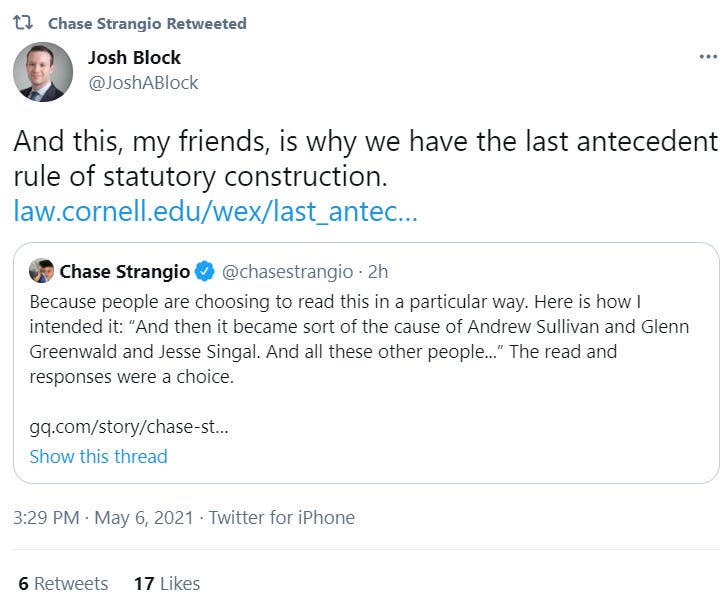ACLU Lawyer: Teehee, My Organization Isn't *Technically* Defaming Anyone!
What is going on at the ACLU?
I’m not sending this out directly to my subscribers’ inboxes because it will probably only be of interest to a small subset of people, but I want to highlight what the American Civil Liberties Union is up to. It’s frustrating.
Yesterday, GQ ran an interview between Saeed Jones and Chase Strangio, one of the highest-profile attorneys at the ACLU, about trans kids that contains the following passage:
I think what we're seeing now is this moment where there are these loud voices who feel so empowered and emboldened to speak out with just utter hatred for trans people. And a lot of it emerging from the UK anti-trans discourse in JK Rowling and then that sort of being an impetus for this Substack brigade, asI [sic] like to call them—that idea of the self-victimized, well-paid writer who wants nothing more than to be able to hate others without consequence. That sort of famed victimhood of censorship, which is really just self-censorship and complaining, whether it was JK Rowling, or Abigail Shrier, and Bari Weiss. And then it became sort of the cause of Andrew Sullivan and Glenn Greenwald and Jesse Singal and all these other people who are just somehow finding their moment to be like, "Oh yes, trans people are so disgusting. And I feel that way. And now I get to frame this around my right to speak without criticism." I did not necessarily anticipate the magnitude of the public discursive escalation and the sense of empowerment that people feel attacking trans people, and doing so while fueling a very dangerous set of legal and policy objectives that I think even these people would claim to not be aligned with. [emphasis mine]
The bolded passage is straightforwardly defamatory. I don’t know if it rises to the level of legal defamation, which is a high threshold in the United States, and I have no plans on suing anyone. But in the straightforward sense of “lying about people in public to attempt to harm their reputations,” it obviously qualifies. Or at least it does when it comes to me: As I noted on Twitter, I’ve never said or written anything, publicly or privately, indicating a disgust for trans people. I can’t speak for Greenwald or Sullivan, though I strongly suspect neither of them has, either.



(And I don’t even understand the inclusion of Bari Weiss in this — has she said or written anything about trans issues in particular?)
So Chase Strangio, arguably the face of the ACLU at this point, decided to fabricate allegations about a number of journalists in the pages of GQ. Not the behavior you’d expect from someone in that sort of position. Strange times, I guess.
That was yesterday. Today, Strangio backtracked a bit, seeming to blame this both on an absent period but also on us rubes who “are choosing to read [the passage] in a particular way.” (The “particular way” in question being “the exact plain meaning of the text, as per basic linguistic conventions regarding the use of conjunctions,” I guess. God, we’re idiots!)


Josh Block, an ACLU staff attorney, piped in, and Strangio retweeted his contribution:


If you click the link, it’ll take you to a law page explaining what the “last antecedent rule of statutory construction” is:
Last antecedent rule is a doctrine where a court interprets a qualifying clause to refer to the immediately preceding words or phrases. For example, when interpreting the phrase “letters or emails drafted by a clerk,” a court would read the qualifying modifier “drafted by a clerk” as referring to “emails” but not “letters.”
This is interesting, I guess, because that’s not how anyone else would read that sentence. And so it goes with the GQ article, too: Block is saying that when it comes to the sentence, “And then it became sort of the cause of Andrew Sullivan and Glenn Greenwald and Jesse Singal and all these other people who are just somehow finding their moment to be like, ‘Oh yes, trans people are so disgusting,’” a court would only attribute “trans people are so disgusting” to “all these other people[.]” Again, that’s very different from the plain-text interpretation 100 out of 100 laypeople would come away with after reading that sentence, but hey, as they say on the internet, IANAL.
I just find this sequence bizarre:
High-profile ACLU staffer defames a bunch of people.
Said staffer blames the defamation on a missing period and/or people reading the sentence the way a human would rather than the way a lawyer would.
ACLU staff attorney chimes in publicly to say, in effect, “Well, it isn’t technically libel because of this nerdy legal rule.”
I don’t understand how anyone at the ACLU could possibly find this acceptable. I’m not wrong in thinking the organization used to be better-functioning and more professional than this, right?



I used to donate to the ACLU, but I won't anymore because the organization has become unrecognizable to me. They used to focus on civil rights and civil liberties, things like free speech, but now they're joining those who want to win various culture wars by shutting down opposition.
I do think it makes sense for the ACLU to oppose laws banning certain treatments for trans kids, because these states should not be interfering in private medical decisions. It's appropriate for the ACLU to fight laws that limit our freedoms.
But otherwise, they're becoming just like every other lefty group. Careless with facts, eager to silence those who disagree, taking sides based on identities. Their involvement in the Smith College situation involving cafeteria workers is another good example.
IA also NAL, but in my opinion it seems like the word "other" would prevent that rule from being applied.